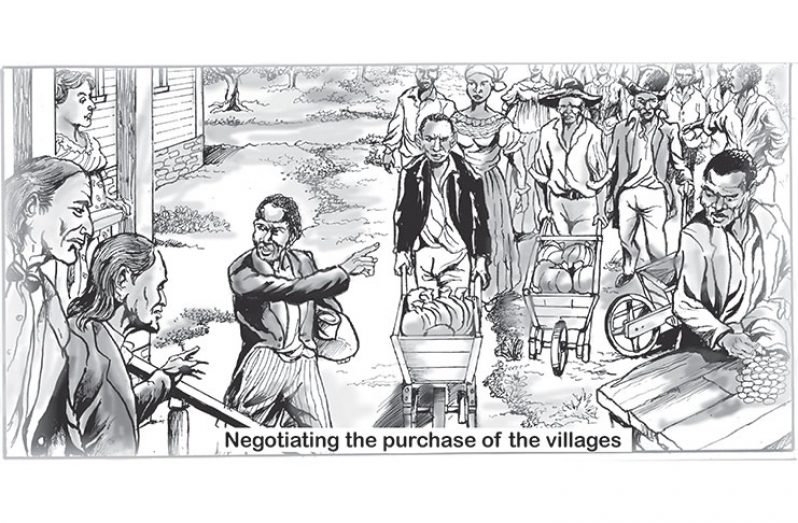–same as produce or perish
TO FULLY understand the idea of ‘Emancipation’ requires exploring the passions and desires of they that wanted emancipation against the rage, fury and the fears of they that wanted the criers of emancipation to remain in physical and mental bondage.
The struggle for ‘Emancipation’ was not over in 1834-38. Truth be told, that’s when it all began, for far worse than chattel slavery are the bonds of philosophical slavery; the self-imposed philosophy of the closed vision that restricts ideas, and rejects possibilities that threaten the stagnating ‘comfort zone’ of the spirit of cliquism.
Much like a cult in the age of Trans-Atlantic slavery, the clique of the plantocracy prevailed in the interest of the merchants that benefitted from the free labour of slaves, and the euphoria as masters over their lives through plantation chattel slavery. Then, with the breaking of the physical shackles, an illusion was added to the still formless vision of emancipation; an illusion that imposed a cultural criterion of a ‘colonial-interpreted emancipation’ that created the cultured colonial, ridden with the ailments of counter-productive pretentions, self protecting against the degradation and trauma of plantation bondage.
Then, from the yard, emerged the “yard fowl” that could afford to purchase the costume of the eagle to soar above the yard, changing itself, creating its clique of devotees, but leaving the yard to its perpetual predicament.
This is the humanity, our humanity of the ages of tribes, and of tribes within tribes that has driven millennia of conquest, and of revolutions among, against, and within every variation [ethnicity] of our species.
AFRO-GUYANESE STORY
Emancipation in this time and space revolves first around the story of Afro-Guyanese, but is inseparably also the story of the whole Guyanese nation. It commands a specific way of thinking that will enable us to either ‘produce or perish’.
Yes! The man was right! His vision was beyond the colonials and “yard fowls” of his time. And, as always, they stood right up in front. I’m talking about Forbes Burnham. He understood ‘Emancipation’; he preached it to the youths of the Youth Corps and the National Service. And all listened; but only few understood.
The clique will always be with us; it is exclusive to all organic life. But when it becomes a retrogressive force, attention must be given to its movements, as when it reverts to the primordial council of fear and its stagnant self-serving comfort zone philosophy in the face of productive efforts, then the clique has succumbed to the spirit of the ‘I and I’, and not of the ‘One’ of Emancipation.
To begin to understand what we’re celebrating on August 1, we must first ask ourselves: Why no village bought by the emancipated slaves was recorded as being torn apart by the conflict of ‘I must own more than you’ in regards to village spaces? Why the village memory lore is populated by its teachers, engineers and healers, rather than that of its wealthy?
Don’t get me wrong! Those who became wealthy grounded and enhanced their lives and the folk environment they honoured.
FREDERICK MAHAICA
Years ago while doing research on ‘The Illustrated History of the Pork Knockers’, I visited the Mahaicony district at Perseverance Village to talk to ‘Boy Charles’ who had worked with the famous miner, Frederick Mahaica. I’m told ‘Boy Charles’ is also now deceased.
Mahaicony is a multi-ethnic area and suffered, through severe political misguidance, in the 1960s. The villagers I spoke to other than ‘Boy Charles’ were both Afro and Indo-Guyanese. They all responded to the name of their famous villager by pointing me to the things he had done for his village, which I listed in the publication. He emancipated those of his villagers who worked with him in his own way, demanding that they upgrade their homes and attend to the responsibilities of their family.
This kind of thinking transcended the clique, but made him vulnerable to the dishonest socialising scavenger cliques he would encounter in Georgetown in the pursuit of his pet hobby, which was Horse Racing.
NO FALLING BY THE WAYSIDE
‘Emancipation’ must never be allowed to fall into the doldrums of a traditional festival chore, a break from the routine as other holidays have become, simply because for lack of discussion the active consciousness shelves the true significance.
To cite an example, as Christmas had become, with the hype of ‘Xmas’ dropping the ‘Christ’ and the values of family and Charity for the pure selfish worship of Dionysus, regardless of our beliefs, family and charity merit the Christmas mindset. Likewise with the event of Emancipation, which I have coined ‘The Genesis of Modern Guyana’.
The freed Africans demonstrated to us up to the Jubilee year of [1880s] Emancipation what their vision was a landscape that they developed while in bondage; a landscape of visions that were undermined and diverted by the fears and spite of the local plantocracy, and the misguiding learned world view of the colonising era, translated into the lowliest of children’s literature, leaving us with volumes of self denouncing myths.
But that we persevere towards another commemoration of Emancipation is enough that the ancestral landscape still resides in the collective memory, and awaits the discourse of awakening.



.jpg)











